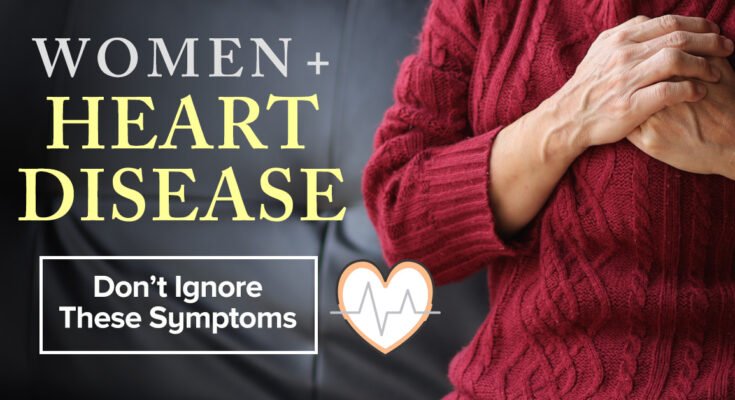Heart attacks are often thought of as a male health issue, but did you know that heart disease is actually the leading cause of death among women in the United States? Understanding the unique symptoms of heart attacks in women can make a life-saving difference. In this post, we’ll explore how heart attack symptoms manifest differently in women and why recognizing these signs is crucial.
Understanding Heart Attack Symptoms
Heart attacks, or myocardial infarctions, occur when blood flow to a part of the heart muscle is blocked. Common symptoms include chest pain or discomfort, shortness of breath, and pain in the arms, back, neck, or jaw. These are often highlighted in health campaigns, but they’re not the whole story—especially for women.
Women need to be aware of heart attack symptoms that may not fit the typical mold. A better understanding of these symptoms can improve early detection and treatment, potentially saving lives.
Differences Between Men and Women
Why Do Symptoms Differ?
Statistics show that heart disease affects both genders, but women often experience different symptoms. According to the American Heart Association, women are more likely than men to experience non-traditional symptoms during a heart attack. This discrepancy can be attributed to biological differences, hormonal influences, and varying risk factors. Recognizing these unique indicators is essential for accurate diagnosis and timely intervention.
The Numbers
Heart disease is responsible for approximately one in every four female deaths in the United States. Despite this, women are less likely than men to be diagnosed with heart disease and receive appropriate treatment. This gap highlights the need for increased awareness and education about gender-specific symptoms.
Common and Uncommon Symptoms
Typical Symptoms
While chest pain remains a common symptom, many women do not experience the classic “crushing” chest pain often associated with heart attacks. Instead, they might feel a sense of tightness, pressure, or squeezing in their chest. This pain can be subtle and mistaken for other ailments.
Uncommon Symptoms
In addition to chest discomfort, women might experience other less familiar symptoms:
- Nausea and Vomiting: Often mistaken for a stomach ailment, these symptoms can precede or accompany a heart attack.
- Extreme Fatigue: Unexplained, severe fatigue that doesn’t improve with rest can be a warning sign.
- Shortness of Breath: Difficulty breathing, even without chest pain, can indicate a heart problem.
- Back or Jaw Pain: Pain radiating to the back, neck, or jaw is more common in women than men.
Real-Life Examples
To illustrate these differences, consider the case of Sarah, a 52-year-old woman who experienced extreme fatigue and slight chest discomfort. She dismissed her symptoms as stress-related until she collapsed at work. Her story underscores the importance of recognizing and acting on atypical symptoms.
Lifestyle Choices and Risk Factors
The Impact of Lifestyle
Lifestyle choices significantly affect heart health. Factors such as diet, exercise, and smoking habits play a crucial role in determining heart disease risk. For women, hormonal changes related to menopause can also impact heart health.
High-Risk Factors
Certain conditions increase the likelihood of heart disease:
- High Blood Pressure: Increases the heart’s workload, causing the heart muscle to thicken and stiffen.
- Diabetes: Women with diabetes are at higher risk of heart disease compared to their male counterparts.
- Obesity: Excess weight strains the heart and exacerbates other risk factors like diabetes and high blood pressure.
Prevention Tips
To reduce risk, women should:
- Exercise Regularly: Aim for at least 150 minutes of moderate aerobic activity per week.
- Eat a Balanced Diet: Focus on fruits, vegetables, whole grains, and lean proteins.
- Avoid Smoking: Smoking cessation is one of the most effective ways to improve heart health.
- Monitor Blood Pressure and Cholesterol: Regular check-ups can help detect and manage risk factors.
The Importance of Immediate Medical Attention
Timely Help Matters
Prompt medical intervention is crucial during a heart attack. Unfortunately, women often delay seeking help due to misinterpreting symptoms or underestimating their severity. Educating women about recognizing heart attack signs can lead to faster treatment and better outcomes.
Overcoming Barriers
Societal norms and misconceptions contribute to delays in seeking care. Women might prioritize family responsibilities over their health or downplay symptoms. Overcoming these barriers requires a cultural shift towards prioritizing women’s health and encouraging proactive medical consultations.
Conclusion
Awareness is the first step toward prevention. By understanding the unique symptoms of heart attacks in women, we can ensure timely and effective medical care. Remember, heart health is not just a man’s issue. Women must prioritize their cardiovascular well-being and seek medical advice if they experience any worrisome symptoms.
Your heart health matters. Take action today and consult with a healthcare professional to assess your risk and develop a plan to keep your heart strong. For more information and resources, visit our website and join our community committed to cardiovascular health.
Read also : The Role of AI in Personalized Medicine: A Game Changer?




